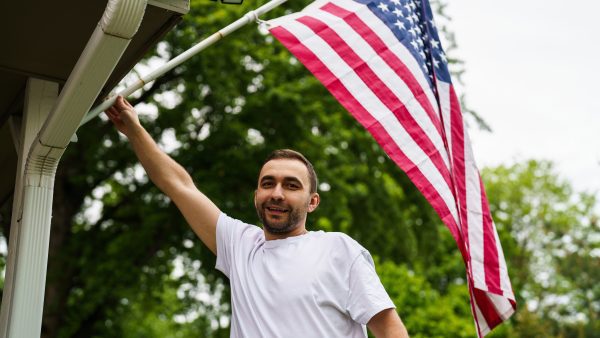If you’ve filed a VA claim for Sleep Apnea secondary to PTSD, chances are you’re going to be scheduled for a C&P exam for Sleep Apnea secondary to PTSD.
In this article, you’ll learn “what” to expect and “how” to prepare for the C&P exam, so you have a better shot at service connecting your Sleep Apnea to PTSD.
Sleep Apnea and PTSD commonly co-exist in military veterans.
Yes, there is a connection between Sleep Apnea and PTSD; however, it is difficult to service connect the two conditions (more on that below).
You Might Like the Following Articles:
- You Might Like the Following Articles:
- What is the Connection Between PTSD and Sleep Apnea?
- What to Expect at Your C&P Exam for Sleep Apnea Secondary to PTSD
- What Questions Will I Get Asked at a C&P Exam for Sleep Apnea Secondary to PTSD?
- How to Prepare for Your C&P Exam for Sleep Apnea and PTSD
- About the Author
What is the Connection Between PTSD and Sleep Apnea?
Current medical research suggests a “significant association” between PTSD and sleep apnea, although the exact nature of the relationship is still being studied.
Here are some key findings from recent medical research:
- High Prevalence of Both Conditions: Studies have consistently shown a high prevalence of sleep apnea among individuals with PTSD. Research indicates that rates of sleep apnea are elevated among veterans with PTSD compared to the general population.
- Biological Mechanisms: There is evidence to suggest that the physiological and neurobiological changes associated with PTSD may contribute to the development or exacerbation of sleep apnea. For example, alterations in the hypothalamic-pituitary-adrenal (HPA) axis and sympathetic nervous system activation observed in PTSD may influence respiratory function during sleep.
- Shared Risk Factors: PTSD and sleep apnea share common risk factors, such as obesity, older age, male gender, and smoking. These shared risk factors may contribute to the observed association between the two conditions.
- Impact on Symptoms and Severity: Research suggests that the presence of sleep apnea in individuals with PTSD may exacerbate PTSD symptoms and decrease treatment response. Sleep disturbances associated with sleep apnea, such as frequent awakenings and fragmented sleep, can worsen symptoms of hyperarousal, nightmares, and daytime dysfunction in individuals with PTSD.
- Treatment Implications: The co-occurrence of PTSD and sleep apnea has important implications for treatment planning and outcomes. Addressing sleep apnea in individuals with PTSD may lead to improvements in sleep quality, daytime functioning, and overall well-being. Conversely, untreated sleep apnea may hinder the effectiveness of PTSD treatment interventions.
Note: Further research is needed to better understand the complex interplay between these two conditions and to develop targeted interventions to improve outcomes for affected individuals.
What to Expect at Your C&P Exam for Sleep Apnea Secondary to PTSD
A C&P exam for Sleep Apnea secondary to PTSD is designed to evaluate whether (#1) You have Sleep Apnea diagnosed by a sleep study, (#2) You have PTSD service connected, and (#3) Whether the Sleep Apnea was proximately due to or aggravated by your PTSD.
It’s very common for the VA to utilize the ACE exam process for secondary claims, including Sleep Apnea secondary to PTSD.
Here’s what you can expect during the exam:
- Medical History Review: The examiner will review your medical records, focusing on your history of PTSD symptoms and treatment, as well as any prior diagnosis or treatment for sleep apnea.
- Symptom Assessment: You’ll be asked about the symptoms you experience related to both PTSD and sleep apnea as well as symptom overlap. This may include questions about nightmares, flashbacks, insomnia, daytime sleepiness, snoring, and breathing pauses during sleep (apneic episodes).
- Functional Impairment: The examiner will assess how your PTSD and sleep apnea affect your daily functioning, including work, relationships, and quality of life.
- Physical Examination: Depending on the examiner’s discretion, a physical examination may be conducted to assess signs of sleep apnea, such as weight, neck circumference, and physical characteristics of the upper airway. If you have an ACE or telehealth exam, there won’t be a physical exam.
- Sleep Study (Polysomnography): The examiner will review the results of your sleep study. If you haven’t been diagnosed with sleep apnea via a sleep study, the examiner could order one although that’s unlikely.
- Medical Opinion on Secondary Relationship: The examiner will provide an opinion on whether your sleep apnea is proximately due to or aggravated by your PTSD, based on the medical evidence, medical research, and his/her clinical judgment. Note: The examiner should review your Nexus Letter for Sleep Apnea secondary to PTSD, assuming you submitted one to the VA.
- Documentation and Reporting: The examiner will document their findings and submit a detailed DBQ report to the VA, which will be used to determine your eligibility for disability benefits.
What Questions Will I Get Asked at a C&P Exam for Sleep Apnea Secondary to PTSD?
During a C&P exam for Sleep Apnea secondary to PTSD, you can expect the examiner to ask a series of questions aimed at gathering information about your medical history, symptoms, and functional impairment.
Pro Tip: You might not get asked any questions if you get an ACE exam (records only review).
Here are some common questions you may encounter during the exam:
Medical History:
- When were you diagnosed with PTSD?
- How long have you experienced symptoms of PTSD?
- Have you been diagnosed with any other medical conditions, including sleep apnea?
- Are you currently receiving treatment for PTSD or sleep apnea? If so, what type of treatment?
Symptoms Related to PTSD and Sleep Apnea:
- Describe your symptoms of PTSD, including nightmares, flashbacks, hypervigilance, and avoidance behaviors.
- How often do you experience nightmares or disrupted sleep due to PTSD-related symptoms?
- What symptoms of sleep apnea do you experience, such as snoring, gasping for air during sleep, daytime sleepiness, or morning headaches?
- What makes you think there’s a connection between your PTSD and sleep apnea?
Impact on Daily Functioning:
- How do your PTSD symptoms and sleep apnea affect your ability to perform daily activities, such as work, household chores, and social interactions?
- Have you experienced any difficulties with concentration, memory, or decision-making due to sleep disturbances or PTSD symptoms?
Treatment History:
- What treatments have you tried for PTSD and sleep apnea? (Medications, therapy, CPAP therapy, other breathing device, etc.)
- Have you noticed any improvements in your symptoms with treatment? If so, to what extent?
Sleep Habits and Environment:
- Describe your typical sleep patterns and environment.
- Do you have difficulty falling asleep, staying asleep, or maintaining restful sleep?
- Are there any factors that exacerbate your sleep disturbances, such as noise, light, or stress?
Quality of Life:
- How has your quality of life been impacted by your PTSD and sleep apnea symptoms?
- Have you experienced any limitations in your ability to work, engage in hobbies, or participate in social activities due to these conditions?
Past Medical History:
- Have you had any surgeries or significant medical events in the past?
- Are you currently taking any medications for other medical conditions?
Please note these are just examples of the types of questions you may encounter during a C&P exam for Sleep Apnea secondary to PTSD.
The examiner should tailor the questions to your individual circumstances to gather a comprehensive understanding of your medical history and current condition.
It’s essential to be honest and provide detailed responses to ensure an accurate assessment of your disability.
How to Prepare for Your C&P Exam for Sleep Apnea and PTSD
Here are some steps to help you prepare for your exam:
- Gather Medical Records: Collect and review all relevant medical records related to your PTSD and sleep apnea, including diagnosis reports, treatment records, sleep study results, and any other documentation from healthcare providers.
- Document Symptoms: Keep a detailed record of your symptoms related to both PTSD and sleep apnea. Note the frequency, severity, and duration of symptoms, as well as any factors that exacerbate or alleviate them. This information will help you accurately describe your condition during the exam. Review it again the day before and day of the exam!
- Review VA Forms and Questionnaires: Familiarize yourself with the VA forms and questionnaires used to assess PTSD and sleep apnea. This includes the Disability Benefits Questionnaires (DBQs) for both conditions, which outline the criteria used to evaluate disability claims.
- Prepare for Questions: Anticipate the types of questions you may be asked during the exam and practice your responses. Be prepared to discuss your medical history, symptoms, treatment history, and how your conditions affect your daily functioning.
- Bring a Support Person: Consider bringing a trusted friend, family member, or advocate to the exam for emotional support and assistance in remembering important details. They can also help ensure that you accurately convey your symptoms and experiences to the examiner.
- Review Your VA Claim File: Take some time to review your VA claim file to ensure that all relevant information and documentation are included. If you notice any discrepancies or missing information, address them with your VA representative before the exam.
- Be Honest and Open: During the exam, be honest and open about your symptoms, experiences, and limitations. Provide detailed responses to the examiner’s questions and don’t hesitate to ask for clarification if needed.
About the Author

Brian Reese
Brian Reese is a world-renowned VA disability benefits expert and the #1 bestselling author of VA Claim Secrets and You Deserve It. Motivated by his own frustration with the VA claim process, Brian founded VA Claims Insider to help disabled veterans secure their VA disability compensation faster, regardless of their past struggles with the VA. Since 2013, he has positively impacted the lives of over 10 million military, veterans, and their families.
A former active-duty Air Force officer, Brian has extensive experience leading diverse teams in challenging international environments, including a combat tour in Afghanistan in 2011 supporting Operation ENDURING FREEDOM.
Brian is a Distinguished Graduate of Management from the United States Air Force Academy and earned his MBA from Oklahoma State University’s Spears School of Business, where he was a National Honor Scholar, ranking in the top 1% of his class.




